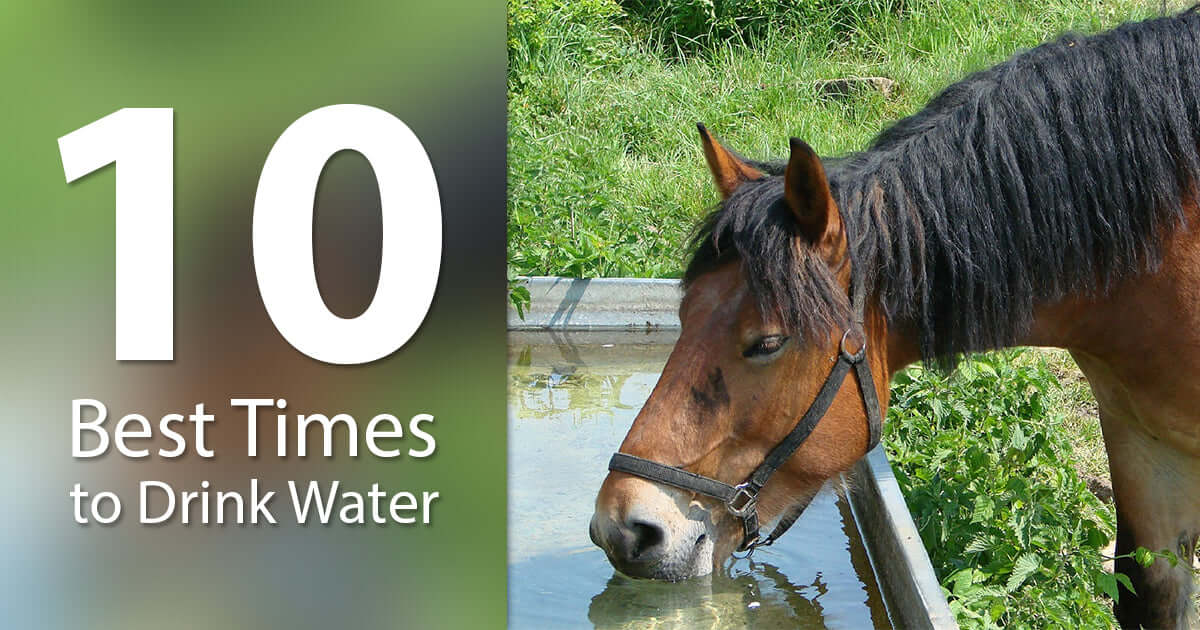How much water are you drinking every day?
Are you well hydrated?
We all know that your body needs enough water to function properly. But did you know that there are a host of situations and specific times wherein you should drink water to remain in top health. Check them out:
When you’re thirsty

It makes sense to drink water right away when you’re thirsty. It should be immediate. The moment you feel your throat is running dry, rehydrate. Don’t wait too long, because thirst is an early sign of dehydration. Your body is already losing 1-2% water when you’re thirsty.
When hunger strikes

Sometimes your brain sends hunger signals when you are thirsty. Thus, you mistake thirst for hunger and you help yourself to pizza instead. When you feel hungry, try drinking a glass of water, because chances are, it’s your brain misleading you. Eat if the hunger persists.
In the morning upon waking up

You have been sleeping for seven hours or eight, and your body might have run out of water a little bit. Remember your brain and body keep working even when you are asleep, and they use water to keep working. One proof that your body is actually losing water at night is your full bladder in the morning. One of the first things you should do in the morning is rehydrate. Drink a glass of clean water. That will jumpstart your digestive system and facilitate bowel movement in the morning. It makes things easier in the toilet.
When you have fever or diarrhea

Several conditions raise your risk to dehydration. You lose more water when you have fever or diarrhoea, so drink more. In cases of urinary tract infections, drinking water helps your urinary system flush bacteria out. Proper hydration also prevents accumulation of kidney stones.
When taking medications

If you are ill and you are taking OTC or prescription drugs, drink more water to help your body get rid of the drugs’ byproducts. Many medications raise your risk of getting kidney stones when you take when without drinking enough water. If you are taking ibuprofen or acetaminophen for your headaches, you should drink enough water to help your kidneys remove metabolites of these medications.
After a drinking spree

Alcohol makes you lose more water. Do you realise that excessive urination during your drinking session means water loss? People who drink don’t usually realise this. At some level they think they are actually pumping fluids into their bodies. Alcohol is not the right fluid for your body. It is a toxin that tricks your stomach with empty calories and overworks the liver. That’s the reason why you feel starved and dehydrated the following morning. Hangover? Dehydration is responsible for hangover headaches.
In hot weather

Australia is one of the hottest and driest places on earth. You may not feel the hot, dry climate if you’re in Canberra or Melbourne, but much of the country is dry. Chances of dehydration are high in these types of climate, so frequent hydration is imperative. Drink more water, especially in summer.
During workouts

You’re not only burning calories when you’re lifting weights or even jogging. You’re also losing more water through sweating and increased breathing. Thus, it makes sense to bring a bottle of water with you to the gym. Alkaline water is best for workouts because not only does it replenish lost H2O but also lost ions. Also, it counters the effects of lactic acid that builds up in muscle tissues during exercise. (Lactic acid is the reason your muscles feel sore after workout.)
When your pee looks yellow or orange

That means you’re dehydrated and you need to rehydrate soon. Your urine should look clear or pale yellow. Otherwise, it means your urine is too concentrated, indicating higher risk for kidney stone formation.
When you’re constipated

Constipation can be due to a number of things, but the common cause is lack of water, which keeps things easy in your gastrointestinal tract. Dehydration makes your stools drier and harder to pass. Constipation causes discomfort. Worse, it results in buildup of toxins in the body. To avoid or treat constipation, drink more water, eat more fiber, and exercise.

Dehydration should never be a problem. There is enough water supply in Australia for everyone. Not all water is created equal though. If you want to be on the right track, drink filtered water. What’s the point in drinking unsafe tap water that will only make you prone to diarrhea?

References:
- 7 Surprising Dos And Don'ts For Drinking Water
- Is it Important to Drink Water Before You Go to Sleep?
- How Much Water Should You Drink? It Depends
- Dehydration and hot weather








